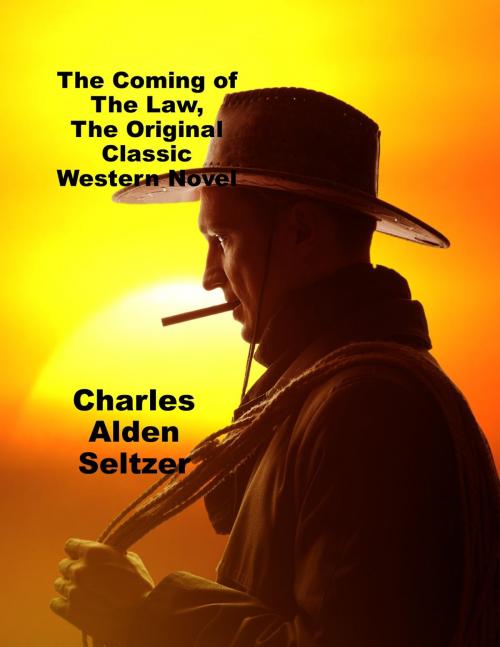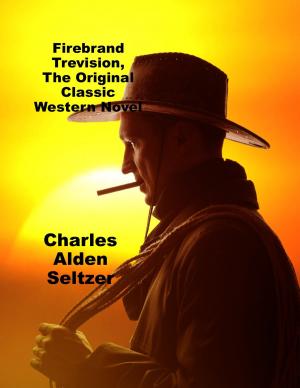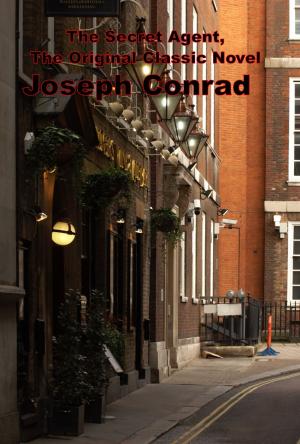| Author: | Charles Alden Seltzer | ISBN: | 1230000388207 |
| Publisher: | Starling and Black | Publication: | April 25, 2015 |
| Imprint: | Starling and Black | Language: | English |
| Author: | Charles Alden Seltzer |
| ISBN: | 1230000388207 |
| Publisher: | Starling and Black |
| Publication: | April 25, 2015 |
| Imprint: | Starling and Black |
| Language: | English |
If the passengers on the west-bound train that pulled up at the little red wooden station at Dry Bottom at the close of a June day in –, were interested in the young man bearing the two suit cases, they gave no evidence of it. True, they noted his departure; with casual glances they watched him as he stepped down upon the platform; but immediately they forgot his athletic figure and his regular featured, serious face as their thoughts returned to the heat, the dust, and the monotony of travel.
There was the usual bustle and activity which always follows the arrival of a train. A mail bag was dumped out of the mail car, another thrown in; some express packages were unceremoniously deposited near the door of the station by the agent; the conductor ran to the telegrapher’s window to receive an order; ran back, signaling as he ran; the engine bell clanged, the drivers clanked, the wheels ground, the passengers sighed, and the train departed on its way.
The young man who had alighted stood motionless for a moment, listening to the clatter of the wheels over the rail-joints, watching the smoke from the engine-stack befoul the clear blue of the sky. Then he smiled grimly, threw a rapid glance toward a group of loungers standing at a corner of the station, and walked over to where the station agent stood examining some newly arrived packages.
“Do you mind directing me to the courthouse?” said the young man.
The agent looked up, turned, and ran a measuring, speculative eye over the new arrival. He noted the Eastern cut of the young man’s clothing and beneath the dust of travel the clear, healthy white skin of his face. “Stranger here?” observed the agent, with a slight, humorous narrowing of the eyes.
“Yes.”
“No, I don’t mind,” resumed the agent, answering the young man’s question. “You won’t have any trouble findin’ the courthouse. There’s only one street in this town an’ the courthouse is down to the other end of it–you couldn’t miss it if you tried.” He grinned with some amusement at the young man’s back as the latter with a cordial “thank you,” returned to his suit cases, gripped them firmly by the handles, and strode down the wooden platform toward the street, ignoring the group of loungers at the corner of the station.
“’Nother tenderfoot,” remarked one of the loungers as the young man passed out of hearing; “they’re runnin’ this country plum to hell!”
The young man strode slowly down the board sidewalk that paralleled the buildings on one side of the street, mentally taking in the dimensions of the town. It was not an inviting picture. Many buildings of various descriptions snuggled the wide, vacant space which the station agent had termed a “street.” Most of the buildings were unpainted and crude, composed of rough boards running perpendicularly, with narrow battens over the joints. There were several brick buildings two stories in height, bearing the appearance of having been recently erected, and these towered over the squat, one-story frames in seeming contemptuous dignity. There were many private dwellings, some stores, but the young man’s first impression was that there was an enormous number of saloons.
If the passengers on the west-bound train that pulled up at the little red wooden station at Dry Bottom at the close of a June day in –, were interested in the young man bearing the two suit cases, they gave no evidence of it. True, they noted his departure; with casual glances they watched him as he stepped down upon the platform; but immediately they forgot his athletic figure and his regular featured, serious face as their thoughts returned to the heat, the dust, and the monotony of travel.
There was the usual bustle and activity which always follows the arrival of a train. A mail bag was dumped out of the mail car, another thrown in; some express packages were unceremoniously deposited near the door of the station by the agent; the conductor ran to the telegrapher’s window to receive an order; ran back, signaling as he ran; the engine bell clanged, the drivers clanked, the wheels ground, the passengers sighed, and the train departed on its way.
The young man who had alighted stood motionless for a moment, listening to the clatter of the wheels over the rail-joints, watching the smoke from the engine-stack befoul the clear blue of the sky. Then he smiled grimly, threw a rapid glance toward a group of loungers standing at a corner of the station, and walked over to where the station agent stood examining some newly arrived packages.
“Do you mind directing me to the courthouse?” said the young man.
The agent looked up, turned, and ran a measuring, speculative eye over the new arrival. He noted the Eastern cut of the young man’s clothing and beneath the dust of travel the clear, healthy white skin of his face. “Stranger here?” observed the agent, with a slight, humorous narrowing of the eyes.
“Yes.”
“No, I don’t mind,” resumed the agent, answering the young man’s question. “You won’t have any trouble findin’ the courthouse. There’s only one street in this town an’ the courthouse is down to the other end of it–you couldn’t miss it if you tried.” He grinned with some amusement at the young man’s back as the latter with a cordial “thank you,” returned to his suit cases, gripped them firmly by the handles, and strode down the wooden platform toward the street, ignoring the group of loungers at the corner of the station.
“’Nother tenderfoot,” remarked one of the loungers as the young man passed out of hearing; “they’re runnin’ this country plum to hell!”
The young man strode slowly down the board sidewalk that paralleled the buildings on one side of the street, mentally taking in the dimensions of the town. It was not an inviting picture. Many buildings of various descriptions snuggled the wide, vacant space which the station agent had termed a “street.” Most of the buildings were unpainted and crude, composed of rough boards running perpendicularly, with narrow battens over the joints. There were several brick buildings two stories in height, bearing the appearance of having been recently erected, and these towered over the squat, one-story frames in seeming contemptuous dignity. There were many private dwellings, some stores, but the young man’s first impression was that there was an enormous number of saloons.















